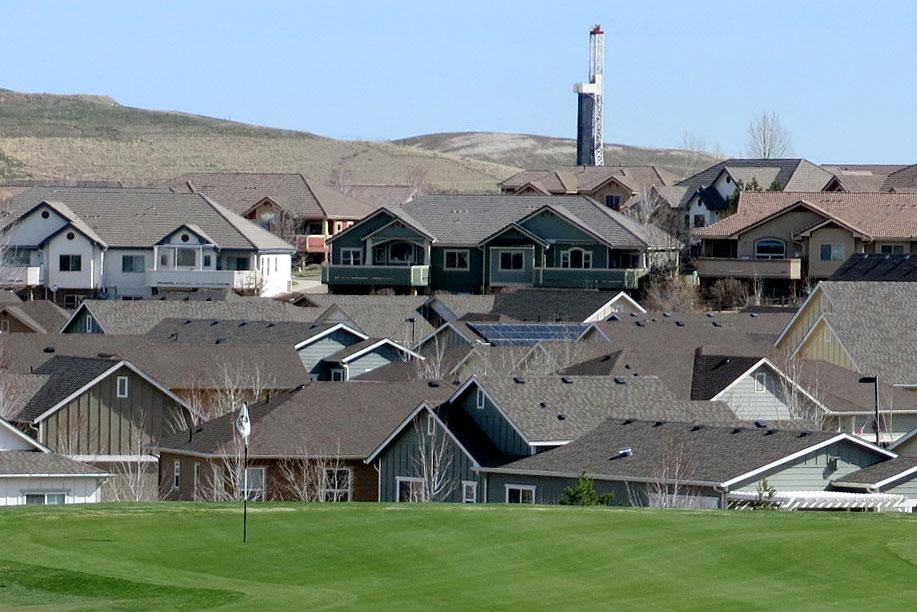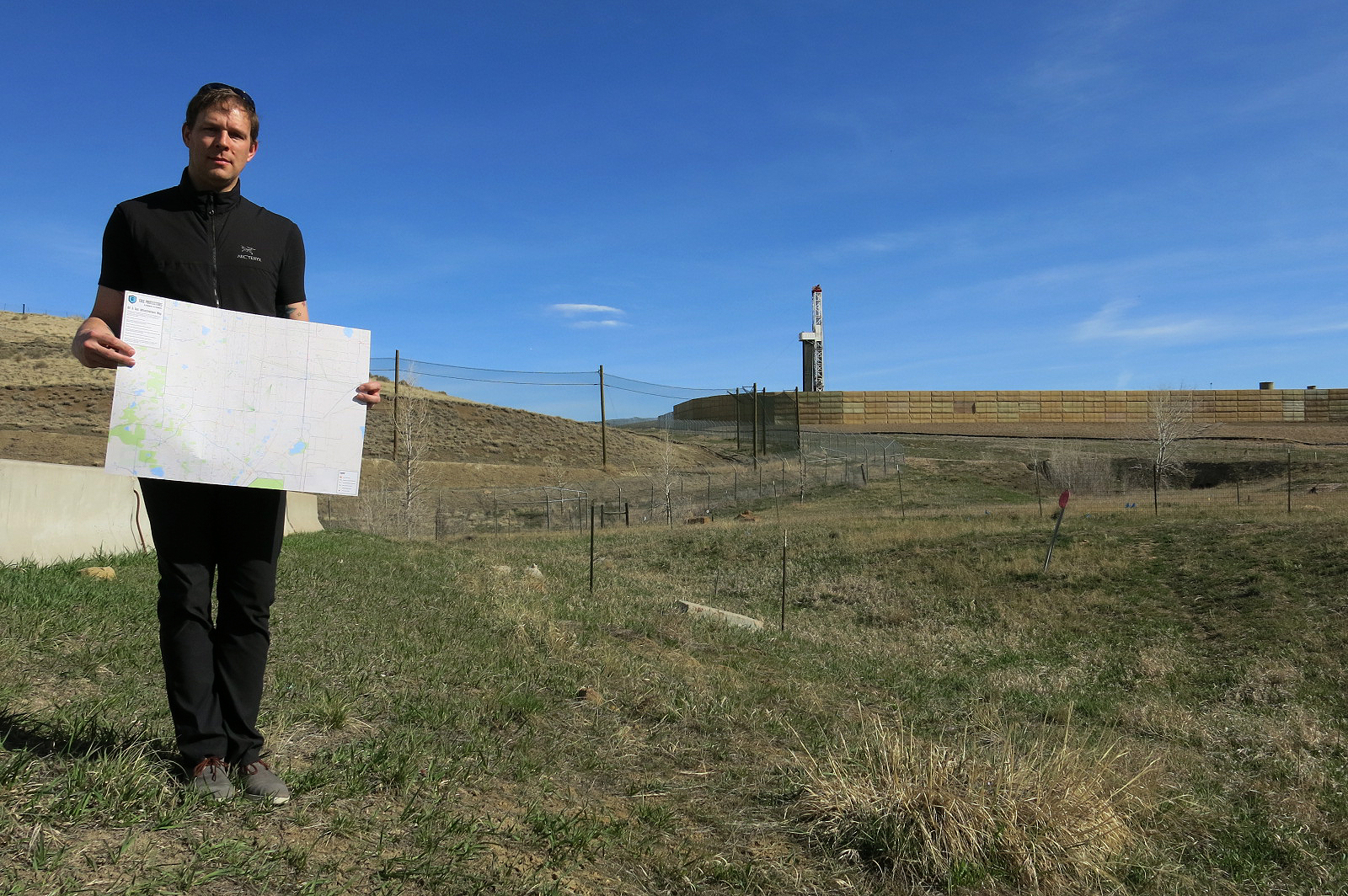

Lunch-hour rush was just getting started at Daddy’s Goodness BBQ outside Greeley on a recent weekday. Customers crowded around the window of the bright red food truck.
“We just had our largest order from an oil and gas worker,” said Matt Smith, who started the food truck two years ago. As a former insurance agent, it took time to build his new business and Greeley’s busy oil and gas economy helps keep him afloat.
If “oil and gas leaves, we’re gone,” Smith said.
That worry has grown as Colorado prepares for sweeping new legislation that will tighten regulations on the state’s oil and gas industry. The bill will make health, safety and the environment higher priorities in decisions about permitting and local land use. It’s now up to the state to hammer out the details of how to implement the law. That process, which will take place over the next year, fuels hope and fear among industry proponents and local control advocates around what’s next.
In Greeley, the epicenter of oil and gas development, frustration with the reform bill is nearly palpable. Weld is where 90 percent of Colorado’s oil is pumped, and the region hosts oil companies, secondary companies that truck water and supplies to well pads, and companies that depend on business from the oil fields, like Smith’s. Many who live in Greeley are opposed to the new reforms.
“There’s a lot of anger, but I think beneath that anger is a lot of fear,” said Barbara Kirkmeyer, Weld County commissioner. “A lot of people are scared of what can happen here.”
The reform bill would give cities and counties more control over where wells go and mandate that state regulators focus more on the environment and people’s safety. The state will need to appoint new members to the Colorado Oil and Gas Conservation Commission who have environmental and public health expertise. The bill also launches rulemakings on a half dozen topics that govern things like well flowlines and methane leaks.
Weld County officials worry those new rules could slow the approval of new drilling permits and cut off the county’s cash flow. In 2018, oil and gas production contributed $490 million in tax revenue, about 60 percent of overall tax dollars for Weld.
“How long is it going to take to make sure that we can start approving permits again so we can get the revenue we’re expecting?” said Weld County Assessor Brenda Dones.
Dones is worried about the current — and growing — backlog of more than 6,000 drilling permits. Reforms at the state level could cause production, and resulting tax revenues, to slip.

In a recent interview with Colorado Matters, Colorado Oil and Gas Conservation Commission Director Jeff Robbins said the agency is already aware of that issue and will continue to work on backlogged permits.
“We are taking some efforts immediately to address the concern of the backlog and how we can make the commission more productive,” he said. “We are continuing to process oil and gas locations [and] well sites at the commission at the same time we’re working hard to bring these new rules into being.”
Still, companies could see new hurdles, including rising costs for permit applications. But Robbins said any oil permit fee hikes won’t happen until the new rules are in place and that will take months.
Perhaps the biggest shift the bill requires is the emphasis on local communities in regulating oil and gas. While Greeley is the headquarters of oil and gas, the town of Erie, to the south, is the epicenter of the local control debate. Residents like Robin Goldsmith there worry more about oil development near homes. Goldsmith has seen multiple oil projects come through her neighborhood.
“The first time when they were close to us and drilling you could actually feel the vibration in our house,” said Goldsmith. That first well pad was about 1,000 feet away, more than twice the distance from homes than the state required. As a result, there wasn’t much she could do to stop the drilling or influence where it happened.
“Hopefully [the bill] will make a difference because in this particular area — in Erie, in Broomfield — there is a ton of activity going on,” she said.
Ultimately it will be up to towns, cities and counties to decide if they want to tackle new rules on oil and gas development. Weld County is against the new local reform measures and likely won’t adopt local control; neither will Greeley. But Boulder County and towns like Erie, Broomfield are expected to make local law changes.
Erie Town trustee Christiaan van Woudenberg said new planning around oil development will begin soon. But that work will be tricky. While van Woudenberg, who ran for office on an anti-hydraulic fracturing platform, cheered the new regulations, he does worry about last-minute changes that favored the industry.

The language in the bill restricts communities to doing only what’s “necessary and reasonable” to protect health and safety.
“So lawyers will decide what that means,” said van Woudenberg. “And the problem is that these oil and gas companies have access to resources magnitudes of orders beyond a town council like Erie.”
Some worry that fear of costly lawsuits will prevent local communities from tackling rulemaking altogether.
“I think the biggest risk there, is that local municipalities won’t even attempt the rulemaking process and local regulation process for fear of being litigated and not having the resources to properly defend their communities,” said Anne Lee Foster, the communications director for Colorado Rising.
Colorado Rising, an environmental anti-fracking group, unsuccessfully pushed for a 2,500 hundred foot distance between wells and homes last November via statewide ballot issue. The group said it’ll be watching closely what happens next. If community controls are stymied by industry in the courts, it will float a statewide ballot issue in 2020 to get even more local control.
But the first potential statewide ballot issue will come from Kirkmeyer and opponents of the reform bill. They hope to repeal the bill and plan to start gathering signatures for a ballot measure this summer.








